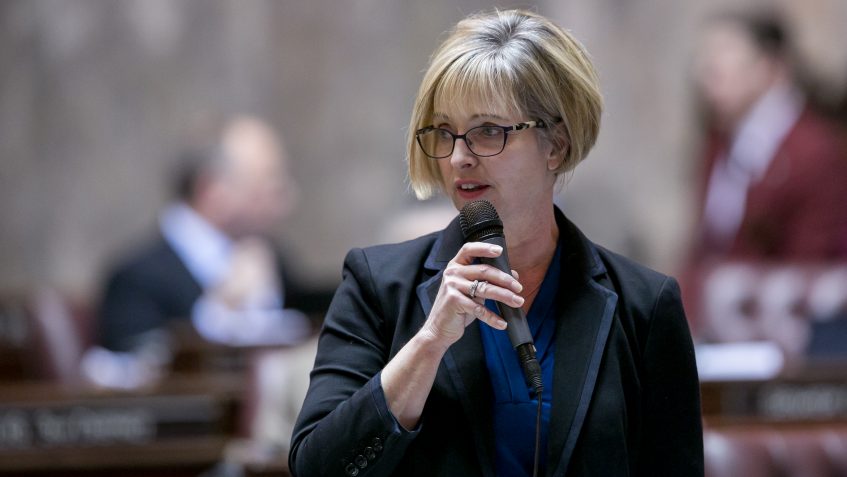Fifteen bills passed today by the Senate would improve health care coverage, access and affordability for vast numbers of people with a wide variety of needs in communities across Washington state.
“When I talk to people, the number-one concern I hear is whether they will able to access the health care coverage they need at a price they can afford,” said Sen. Annette Cleveland (D-Vancouver), who chairs the Senate Health & Long Term Care Committee. “The Trump Administration has done everything in its power to undermine the health care coverage advances we’ve made in Washington. These bills are necessary to put people first, ahead of big pharma and other special interests, and address the health care needs our households face first and foremost.”
Two bills directly address the three major Democratic priorities — affordability, access, and extent of coverage — by creating affordable plans for people without health care and by setting the state on a path toward health care for all.
Senate Bill 5526, sponsored by Sen. David Frockt (D-Seattle), would create affordable insurance plans for those whose employers do not provide health care plans, ensuring that all Washingtonians are covered, through the creation of Cascade Care.
SB 5822, sponsored by Sen. Emily Randall (D-Bremerton), would create a work group to identify and recommend how the state can achieve universal health care and what would be the best system for achieving that, such as a single payer system or other solution.
Other bills would address a more diverse range of needs.
SB 5415, sponsored by Sen. John McCoy (D-Tulalip), would establish an Indian Health Improvement Reinvestment Account to use new state savings from recent federal reimbursement policy changes to fund programs that improve the health of American Indians and Alaska Natives in Washington state.
SB 5828, sponsored by Cleveland, would help people stay in their own homes by increasing payment for Medicaid home health services to no less than 100 percent of the Medicare rate, reimbursing costs for social workers and telemedicines under the Medicaid home health benefit, and improving reimbursement methodology.
SB 5846, sponsored by Sen. Rebecca Saldaña, would increase the availability and cultural competency of health professionals, particularly in rural areas.
SB 5184, sponsored by Sen. Patty Kuderer (D-Bellevue), would protect consumers from being signed up for mail-order prescription plans without their knowledge or consent.
SB 5274, sponsored by Sen. Bob Hasegawa (D-Seattle), would establish a dental care program for Washington residents who are citizens of the Republic of the Marshall Islands, the Federated States of Micronesia, or the Republic of Palau. These exploited populations were provided residency in the United States, but not health care coverage, because their home islands had been used as target practice for nuclear bombs. The state assumed responsibility for providing their health care, and this legislation extends their coverage to include dental care.
SB 5359, sponsored by Cleveland, would address the steeply rising caseload of complaints about residential service providers from people with developmental disabilities by charging a fee to fund the hiring of additional investigators.
SB 5741, sponsored by Sen. Karen Keiser (D-Des Moines), would ensure fiscal sustainability for the state’s database that provides information on the prices for health care services in specific geographic areas.
“No one should have to go broke trying to keep up with the cost of health care, and no one should have to cut corners on their health in order to pay for food or other basic expenses,” Cleveland said. “These important bills address a wide range of needs and ensure our state will continue to be a leader in the fight for accessible, affordable health care that covers their true needs.”
Other health care bills that passed today include:
SB 5523 would improve the performance of managed care organizations contracted to care for Medicaid clients in Washington state by making portions of their funding contingent upon their performance meeting or exceeding the national average for access to care, preventative care, chronic care management, and medical care utilization.
SB 5054 would expand the behavioral health workforce by creating a reciprocity and probationary program for mental health professionals licensed in another state.
SB 5385 would ensure parity by requiring health plans to pay the same rate for a health care service provided through telemedicine as is paid for an in-person service.
SB 5389 would allow the use of teleconsultants to assist students at risk of substance abuse, violence or suicide.
SB 5483 would improve services for people with disabilities by requiring the Department of Social and Health Services (DSHS) to track and monitor certain client hospitalizations.
SB 5536 would help people with developmental disabilities by directing DSHS to assess whether patients in care facilities are benefiting from active treatment or if they should be moved to an alternative setting that more appropriately meets their needs.
###
For
interviews: Sen. Annette Cleveland,
360-786-7696
For information: Rick Manugian, Senate
Democratic Communications, 360-786-7569




